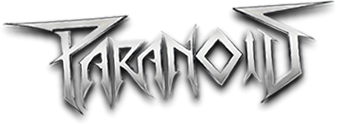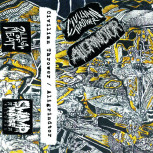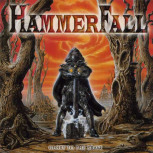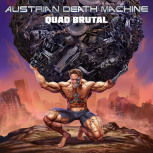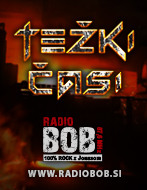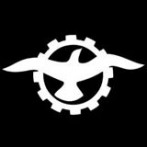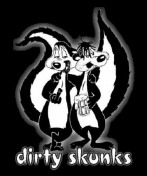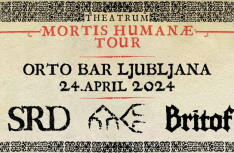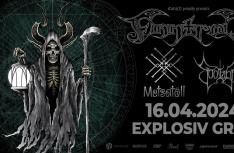Photos by Espen Ixtlan.
At the Inferno Metal festival this year I got the chance to talk to Espen Ixtlan. He was Satyricon's band photographer for many years, the result of this collaboration was the publication of the book Satyricon In Europe 2006-2022, the first and only ever authorised book about Satyricon. Our conversation was completely spontaneous and was a collage of several previous conversations on the first days of the festival. So you’ll read different stories about how Espen got to know the band, what good and exciting things he experienced with the band and what plans the band still has.
DEJAN: I thought we could start with a simple question. Can you introduce yourself a little bit?
ESPEN: Of course. My name is Espen Ixtlan, former press photographer. I got tired of accidents, killings and shit like that. I joined the music business about 17 years ago and have been working with bands like Ministry, The Dandy Warhols, Apoptygma Berzerk and of course Satyricon, mainly Satyricon.
DEJAN: So you started in 2006?
ESPEN: 2006 was my first concert. I wasn't working for Satyricon then but my friend Anders, he was the tour manager for Satyricon at that time, called me after maybe six months after the concert after seeing the photos. And he invited me to join Satyricon as a driver, not photographer. But he was always promising me a photo pass so I could take photos. And then the snowball started to roll. So I was mainly driving for maybe three or four of the first years, but then they saw the photos and realised that was really good because I could really sort of relate to Satyricon.
DEJAN: So you weren't a fan before?
ESPEN: No, I wasn't a fan before. I was actually not a black metal fan at all, because I didn't pay so much attention to it. I paid attention to the very violent start with the church fires and the killings and the suicides. Very interesting, but I was never a fan of double bass drums really. But after Satyricon I started to listen and get into the atmosphere and the philosophy and how they were thinking about things. After that it was no way back.
DEJAN: Yeah, I can imagine how it works. It was the same with me only maybe ten years earlier.
ESPEN: Yeah, you were much earlier than me. I was more into, like I said yesterday, industrial metal and metal in general, but not black metal. So maybe I shouldn't say this, but I was really, really late, you know.
DEJAN: Maybe this question would be better a little bit later, but since we’re talking about this now - so this whole project, it was like, let's say, an accident happened.
ESPEN: Accidentally, absolutely. And I think that's what happens many times. You're in the right place at the right time but doing something different. But they saw the photos and they started to understand that I understood their way of expressing. As Sigurd says, many photographers have been taking great photos of Satyricon over the years. But as he says, maybe not understanding the way Satyricon wants to look. And I think I spent quite a few years figuring it out, you know, to break the codes.
DEJAN: The essence of Satyricon?
ESPEN: Yes, the essence of Satyricon, absolutely. And it's like that with all the balance I work with. They want to appear as good as possible, but not necessarily the way the photographers think. So I had to put my preferences back and listen to what Satyricon wanted to achieve with the photos. That took some time. At the first concert I was really struggling with little light, it was almost pitch black, and such an energetic band. Things were happening so fast. So I realised this is really technically difficult photography. And that was a challenge. But that is also something that drives me; the challenge and the difficulties you just have to get over and make it. So, yeah, I think I grew as a photographer.![]()
DEJAN: I now understand the year 2006.
ESPEN: Yes. My first gig, my first job in 2008, after that it continued like that till 2010. Then came the opera concert. I was invited with an AAA pass and a photo pass, but not as a photographer. I was invited because I had done a good job with everything else. They saw my photos and they wanted to use the photos for the opera release, DVDs, albums and CDs. So basically in 2013, things started to really develop.
DEJAN: But if it weren't for COVID, would the book still be entitled, I don't know, 2022 or the book wouldn’t be out yet? What do you say? So why 2022?
ESPEN: Because lots of the photos were actually taken in 2022. So that's why we chose 2006 and 2022. We were discussing it because the last time I took live photos of Satyricon was in 2019, I think. But a lot of photos are actually coming from a little bit later too. But COVID was a great opportunity to work with this project because I had the time. Everything else was shut down, no touring, no nothing. So I'm very happy for that period because I had the time to really dive into the material I had. It's maybe 80,000 raw files. So, quite a job to do.
For the book I used mobile phones, small cameras and professional cameras, whatever I had at hand. I like it when people work with what they have at hand. You don't have to have super expensive equipment as long as you know how to operate things. A mobile phone is actually quite good sometimes, at the moment. Suddenly you are in a concert and it works with a mobile phone, no problem.
DEJAN: So, how did you decide which photos to use? You said 80,000.
ESPEN: Yeah, 80,000.
DEJAN: And how many are there in the book?
ESPEN: I think there are 250 photos.
DEJAN: So like less than one percent?
ESPEN: The hard job was actually to kill your babies. Since I'm an educated press photographer, I wanted to try to tell a story that was not to use too many live photos, but having breaks in the book so people don't get tired. If you see like 20 live photos in a row, you get a little bit bored, because they have to be exceptionally good. So I was trying to tell a story that could explain the sort of progression. And like that it would be very interesting to turn to the next page. But as I said, it is very difficult to throw out many of my favourite photos. I had to let go of them because I thought they were not fitting into this concept. So that was a very difficult job, because as a photographer, you will always love to have your photos available for people. But you can't do it all, you know.
DEJAN: I forgot my next question.
ESPEN: No problem, no problem. We can speak about the reason why the book was becoming a reality, for instance, because I was working with Ministry.
DEJAN: The American industrial metal legends?
ESPEN: Yes. They called me in 2019, when I was on holiday on Corfu in Greece. And they were making a sort of visual book, not only with photos, but with artwork, posters and whatever Ministry had used over the years. And they wanted me to contribute with some photos and I was really grateful and honoured. So I sent them a bunch of photos and I think they used four or five in this book. After that they sent me two copies of the book; one regular edition and one more luxurious with singles and records and stuff. I kept the luxurious one for myself. But the other one I gave to Wongraven, Satyr. I hoped that maybe he would get inspired by the Ministry book. After a week he called me and said, maybe we should make a book too. I was really honoured for that. I just asked him how he wanted to do it. The only issue he had was the size. I would have to make it larger than the Ministry book. Of course I said. We wanted to make the book in record size, 31 x 31 cm. But no printing shop would do it because the book would be so heavy. So shipping it around would be far too expensive. So we had to downsize it to, I think it's 25 cm, it's square.
Satyricon was not involved in the creative work of the book. They only gave permission to do it. But we spoke about how we should do it. And this is supposed to be like a sort of the tour life, the hard work, the touring. The live things and sort of trying to express how much work and how much effort you have to put in to really function as a top-division black metal band. So they did not tell me which photos I had to use.
DEJAN: Regarding the tough touring ... I remember some kind of story, not related to Satyricon, but going on tour in general. I read it somewhere on Facebook, some English guy was talking to his favourite band that they should come to his town somewhere in England because he would love to see them there. And then the band replied he could come to London and travel like they do. When you're talking about tough life on the street or touring, it's not like sitting at home in your living room and watching TV. It's a lot of effort.
ESPEN: It is.
DEJAN: You don't see your family and so on and so on.
ESPEN: Maybe you know that Norway's very famous for sports. We have an organisation called The Norwegian Olympic Sport Centre. Satyricon has always been connected to that group for training, for the hard work. They have always been very serious about practising and being fit. Satyricon was maybe one of the first bands that really had no alcohol on the bus. You could actually drink outside the bus, but the bus is your home. They have learned the whole lesson. Earlier there was a party on the bus and toilets were flooding and hookers and drugs, whatever. But when you get older, I think you realise you have to be fit and in shape to manage to play five concerts in a week. And every concert is like two and a half hours. So it's really physical. And if you are not in shape, you have nothing to do on the stage, actually. I've seen a lot of bands like, for instance, Ministry. They are maybe an exception to the rule because the more drugs and the more alcohol they consumed, the better they became. Normally it's not like that with a band.
People are paying a lot of money to go and see you. People are travelling far, and appearing in a shitty shape on stage is just something you should never do.![]()
DEJAN: Now I remember the question from before. There aren't only pictures, not only photos in the book. There's also a lot of text. So you are also the author of the text?
ESPEN: No. Well, I decided who would be. I wanted to contribute with the text. And I was thinking like, only photographs would be really boring. Because of the 20, 30 pages you've seen it all. So, I was speaking with Wongraven and we decided that people within the band should tell their sort of funny stories about the hardship of touring or if they're very annoyed about something. So many things have happened during the years.
Several people were contributing, like lightning engineers, sound engineers and also Sivert Høyem from Madrugada. He was singing on the album Satyricon from 2013 on the song called Phoenix. He also did a lot of shows with Satyricon as a special guest and I wanted his version of when he met Sigurd. I think they were participating in a debate with several other artists about the latest production of Britney Spears. And Sigurd was a very harsh critic: "Oh, fuck this shit!" and blah, blah. And I think Sivert was kind of fascinated over his sort of confidence and he didn't mind saying it. I thought his story would be important.
Then there is Rebel Wizard, a metal guy from Australia, growing up in New South Wales as a lonely black metal fan, because no one listened to black metal in Australia in 1995. He got the Nemesis Divina album and was so inspired by it that he became an artist. He told me that he couldn’t afford to buy the record so he had to steal money. I think that was like a great example of the globalisation of black metal. I think his story was really touching.
And also we have the girl from administration, the Instagram and the Satyricon fan page. She's also written a text and got photos from fans all over the world. So I had to pick out a lot of photos. I think it's very important that the fans are represented in the book, because they are, after all, the people who keep the thing going by buying records, going to concerts, buying merchandise.
DEJAN: I have to admit, the first thing when I held your book in my hands was, where am I? Am I in the book? Am I in the book? So yes, I can understand it. When we publish photos from a gig, we always care or make sure that the crowd is also there.
ESPEN: Absolutely, absolutely.
DEJAN: So the visitors can look where they are, how they look.
ESPEN: That was also my priority, to have a lot of photos with the fans, the people watching. Because it's always like: “Oh wow, I'm actually in the photo.” And besides, all respect to the fans who spend their hard-earned money, travelling, involving the band, buying everything. That's what keeps the business going. So all respect to them. In the end I am a fan myself too, you know. I travel far and wide to go and see my favourite bands. And I want value for my money. And I think that's very important. Fans are so important.
DEJAN: But it's always a thin line how far a fan should go or can go.
ESPEN: Of course, of course.
DEJAN: I don't know if I told you before. I was sitting here yesterday, across the street, drinking coffee. And suddenly Ihsahn from Emperor, some woman, maybe a journalist, and his son came in. The whole time I was struggling, should I say something, should I ask for a photo or not? He is here privately so can I disturb him?
ESPEN: It's a very thin line. But I think mainly people are respectful. And I think many bands are very private. But the attention is also a thing that drives the bands. Going around in the street and being recognized by nobody would probably be a little bit boring, too. But I think most fans are very respectful due to the privacy and everything. But Satyricon has always spent a lot of time after the concert to meet the fans, take photos, and sign everything. It's been some places with 300 or 400 people and that so you can stand there for three hours. But they did it, because actually these guys are paying your bills. So all respect for that.
DEJAN: I agree.
DEJAN: Anything else? What should we talk about?
ESPEN: Well, there are a lot of things that happen on tour that should stay on tour. But, you know, it is not dangerous to say that there's been many conflicts, of course.
DEJAN: You mean inside the band?
ESPEN: Yes, with band members, Sigurd, the crew, whatever. Because Sigurd is very demanding. You are not in Satyricon in a crew or travelling with them for no reason. You are there because you are very good at what you do and have to deliver. But there have been fights, you know, people were arrested. Actually, one time in Canada, I think it was in 2008 or 2009. Two members of the band were actually arrested and accused of rape.
DEJAN: Yeah, I remember.
ESPEN: And Sigurd told me that was no fun because they were innocent. A girl was just trying to invite herself to some fun. But they declined and said no. But then she reported them to the police and they were arrested, of course. So, Sigurd had to get a hold of his attorney to bail them out. That cost a lot of money, 30,000 or 40,000 euros. And that is okay, Sigurd said. But the main problem was waking up because people were calling: "You're on the front page of every Norwegian newspaper now. Satyricon members arrested for rape!" Bad for business, you know.
DEJAN: Of course.
ESPEN: Some people say that all PR is good PR, but I don't think so in that case. And of course, they hadn't made any photos of the band members, but it was Sigurd on the front pages, you know. So, people were talking: “Oh, he's been raping some girls now.” That is difficult.
But I can also say that many fans are also sort of having the feeling of ownership over the band. Like, because they are such ultra-fans, hardcore fans that they think they deserve extra attention and are stalking you. Girls offering this, offering that, you know. I remember we were in Poland, in the club Progresja, in Warsaw. And suddenly everybody’s phones were beeping. And some girls were actually offering themselves gangbangs with the band. How did they get the numbers? I don't know. Some people are like that.
DEJAN: I don't even know what to say now. I am speechless.
ESPEN: I understand, but that's how it is. I remember in 2015 on the European tour, there was lots of conflict on the fan pages on Facebook because fans were rivalling and quarrelling with each other about who owned the band more and stuff like that. It was like you had to almost ban people from the shows. Because they were not there for the band, they were there to sort of profit from it.![]()
DEJAN: I remembered something now. We've got Roadkill Extravaganza that has covered the Rebel Extravaganza tour. Till 2000 or 2001. Then we've got your book now. Any plans for the future?
ESPEN: Yes, I will continue to study art history.
DEJAN: Okay.
ESPEN: And I want to have time to paint my own paintings, because I've always been interested in art. But when I was a kid, I figured out that it would be possibly easier to operate a camera than to master the brush strokes of Rembrandt or Munch or whatever. But now I have the time to do it. You have to be occupied, you know.
When you are a photographer working for someone, you are doing your own work, but you are not free to decide, if you understand. So now I want to express what I have in my head in painting.
DEJAN: But when Satyricon is on tour again, will you go with them?
ESPEN: I hope so. They are actually making new music now, rehearsing.
DEJAN: This is actually for a new album? Not the cover stuff they promised some time ago?
ESPEN: No, it's about a new album. New music, totally new album.
DEJAN: Okay.
ESPEN: The last album Satyricon & Munch was like interpreting Munch's visions in music. So I think many fans were surprised and a little bit, wow, what a way to go. But I think it was actually very brilliant. And black metal is also so connected to a certain part of the national romantic time here. I think Satyricon was like the next side of Munch. It was very compatible. But now there are only Satyr and Frost left, all the other guys were fired.
DEJAN: Because of COVID?
ESPEN: Yeah. After COVID the bank account went down. No money came in, there was no touring. And it's very expensive. Besides, it takes a lot of effort to exercise and practice every day to be a band in that top division. I think now there is like a new start. I heard yesterday about things I can't say anything about, but they will actually go on festival tours again. I'm so certain of it with new band members. But never any more extensive touring like Munch's On The Road, like a world tour of maybe 300 gigs per year. They will maybe go to festivals, 8 or 10 gigs a year.
DEJAN: I've got a feeling I will have to come back to Oslo to see Satyricon once more.
ESPEN: You must, you must, you know. I think festivals are always cool. There are lots of people, huge venues, much easier to reach out to more people than in small clubs. But Satyricon were playing small clubs, big venues, whatever.
DEJAN: Yeah, of course. But if you ask me, I prefer the small ones because I like this personal connection.
ESPEN: I agree.
DEJAN: Standing in the first row in Wacken, for instance, is completely different from standing in the first line here at Rockefeller.
ESPEN: Absolutely, like 50,000 people, you know. Kind of very impersonal. I like the clubs, too. We have played in clubs in, for instance, Manchester, maybe room for 250 people. The next day a gig with 3,000 people, then a festival with 15,000 people and then back to small clubs again. That's really interesting. I think the atmosphere in small clubs is more ...
DEJAN: … intimate?
ESPEN: Yes. And it feels like you are more in connection with the band as a spectator.
DEJAN: I also had this feeling again yesterday. I was watching Nile from the balcony and it wasn't the same feeling because I needed the sound around me.
ESPEN: I agree. I agree totally. What I noticed, when going to Europe, for instance France, Holland or whatever … They are building such perfect venues now. With the floors so everybody can see, and very big doors, easy to move equipment and things like that. Actually designed for concerts. Many places are not designed for concerts, but this is how it works. This is what you do with what you have.
DEJAN: True. Well, this would be it.
ESPEN: Happy?
DEJAN: Happy.
